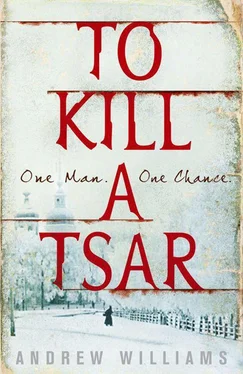‘I’m not,’ replied Dobrshinsky.
‘Your fellow Barclay didn’t help matters, of course. No matter now. The doctor will be accompanied by the British military attaché. Of course, he’s not to see the woman before he goes.’
‘No.’
The count shifted at the edge of the chair as if in two minds whether to rise. If he was feeling uncomfortable, that was how it should be. Dobrshinsky had no intention of making his task easier.
‘Of course it’s galling we can’t punish him properly,’ said the chief prosecutor.
‘Love, livelihood, family… he will lose all those things.’
‘Not enough,’ said von Plehve impatiently, ‘withholding information, consorting with terrorists, and God knows what else he was doing for them.’
They gazed across the desk at each other, the count smoothing his large moustache with his thumb and forefinger. Dobrshinsky had barely set foot in his office at Fontanka 16 before the prosecutor arrived unannounced at his door. He was dressed in his ceremonial uniform and had come directly from a meeting with the tsar’s chief minister, Loris-Melikov, that he described with the slippery understatement of the consummate politician as ‘difficult’. Dobrshinsky was quite sure he knew why. He had been expecting a ‘difficult’ conversation for some while. Perhaps it was only coincidence but it struck him as a fitting one that von Plehve should choose the hour the tsar’s murderers were to be laid in their unmarked graves. In the morning the English doctor would be gone too. It was like a roman policier , with the loose threads gathered in the final pages. And yet the story was not over. How could it be?
‘Of course, everyone is very grateful to you, my dear Anton Frankzevich,’ said the count, breaking the awkward silence at last. ‘His Excellency Count Loris-Melikov was particularly anxious I should say so…’ He paused to allow the special investigator to acknowledge this gracious compliment. But Dobrshinsky had no intention of offering him even a sliver of encouragement. Von Plehve cleared his throat a little nervously. ‘We all recognise what a… a challenge it has been… how difficult…’ Again he waited for Dobrshinsky to reply but he was not to be drawn.
Irritated by his watchful silence, the count levered himself from the creaking chair with the intention of putting more than the width of the desk between them. His boots squeaked a little comically on the polished parquet floor as he made his way to the windows. The embankment was busier than was customary at that hour, with servants and tradesmen chatting on the pavement opposite, too excited by the spectacle they had witnessed to settle to their usual chores. ‘The new emperor wants firmer measures,’ von Plehve said, turning back to the room. ‘No accommodation with terror.’ He was almost a silhouette against the window. ‘There is to be a new secret department — the Okhrana — based here, at Fontanka 16.’
‘Same task, new name?’
‘And new methods. Ah, you smile…’ said the count tartly. ‘What can there be to smile about?’
‘New methods?’
‘This is a battle for the soul of Russia, Anton Frankzevich. And in such a battle the Okhrana will use all the weapons at its disposal.’ The count spoke with the glibness of one who has learnt lines but is yet to fully comprehend their meaning. ‘It will be more robust, the ends will justify the means…’
‘An interesting perspective from a lawyer.’
‘My dear Anton Frankzevich, I should not have to remind you that the terrorist does not acknowledge the rule of law… no, we need new methods…’
‘And new people?’
‘Yes.’
The French mantel clock filled the silence again, as it had unfailingly done for the two years the special investigator had occupied his post. At first it had nagged Dobrshinsky but now he found comfort in its inexorable ticking, and he had resolved to take it with him.
‘It is His Excellency’s view that it is important to restore confidence… the death of the tsar… the bomb at the palace… those who were unable to prevent these outrages are to be found other work.’
The light from the window seemed to flicker as von Plehve shifted awkwardly from foot to foot.
‘His Excellency appreciates your contribution in bringing the terrorists to justice — The People’s Will is broken,’ he paused, then added pointedly, ‘even if the Figner woman is still at liberty.’
‘There will be others. After the grisly spectacle today, there will be more assassinations, more bombs.’
‘Yes, there will be…’ Von Plehve hesitated to consider his next words carefully. ‘But ours is not to question… we are servants of a tsar. To consider moderate measures is useless when circumstances and the hour are set at extremes.’
Dobrshinsky nodded slowly then pushed his chair away and walked round his desk to join the chief prosecutor at the window. They were only an arm’s length apart, the view on to the street between them.
‘You look ill. You must rest,’ said von Plehve with a soapy pretence at concern. ‘Of course your old post will be held for you at the Ministry of Justice.’
Dobrshinsky gazed out on to the Fontanka below, as he had done on his first day. The ice was melting at last and the dirty snow on its surface would soon be washed away. The sun was lost in a low grey Petersburg sky that seemed to leach colour from the mansions opposite.
‘Will we live to see it?’ he asked suddenly.
‘You mean…?’ Von Plehve was alarmed by the directness of his question and the implied pessimism. ‘I take you to mean a revolution? Speaking for myself, I feel sure I won’t.’
Dobrshinsky was still standing at the window a few minutes later as the count climbed the steps into his carriage. A lawyer, a politician, the director of the new Okhrana — oh yes, Dobrshinsky was sure he was to be the first — von Plehve would act without scruple in defence of divinely inspired order. But he bore him no ill will. He felt no anger, and only a little regret. He felt relief that it was over and a hunger for his dark corner and un état oubli .
A more perfect, stronger revolutionary organisation will take the place of the groups that are wiped out… A terrible outburst, a bloody subversion, a violent revolutionary convulsion throughout all Russia, will complete the process of the overthrow of the old order… And so Your Majesty, decide. Before you are two courses.
Letter to Tsar Alexander III from the executive committee of The People’s Will pleading for a democratic assembly and freedom of speech
1 NOVEMBER 1882
MALAYA ITALYANSKAYA STREET
ST PETERSBURG
The well-built young gentleman in the top hat and fur coat was too merry to notice that someone was keeping pace on the pavement opposite. After a convivial evening at a restaurant on the Nevsky Prospekt, he had elected to walk home in the hope cold air would clear the claret from his befuddled brain. At first his pursuer had followed at a discreet distance, but it had shortened when it became apparent from his rolling gait that the young gentleman was very much the worse for wear from drink. Turning into Malaya Italyanskaya Street, he slipped on a patch of ice and, with desperate flailing limbs, fought to stay on his feet. It made his pursuer smile. What would the readers of The Times of London make of such an undignified display? Fortunately, the new mansion block where Mr George Dobson rented his apartment was only a few yards further and these he was able to execute safely with tiny Japanese steps.
Dobson was snoozing in a chair beside the fire with a glass of strong black tea balanced on the arm when the bell rang. It was nearly midnight, he had discarded his jacket and boots, his head was beginning to ache and he was in no mood to welcome visitors. It rang again as he was smoothing his hair in front of the mirror. Muttering profanities under his breath, he hurried into the hall and drew back the locks. It was a woman of perhaps thirty in a heavy brown coat that had seen many winters and was far too big for her small frame. She was wearing a green scarf about her face and a traditional winter hat of rabbit fur. She was better dressed than most peasants, but only a little.
Читать дальше












